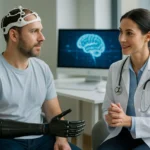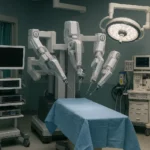How Deep Brain Stimulation Is Giving Back Control to Neurology Patients?
Imagine your body betraying you, when you go to write, your hands shake, your legs freeze while walking; it is hard to speak and even the simplest tasks feel like climbing Mount Everest. Millions worldwide suffer from neurological disorders such in their life. But now, Deep Brain Stimulation, a new and innovative treatment is changing that.
DBS is a bit more than just a medical procedure it is a lifeline. Over the past few years, moreover this neuromodulation therapy has greatly evolved in its precision and application, providing hope in situations where medication and conventional therapy have failed. In this blog, we will examine What DBS is? and How does it works? What is new in that field, and How it is truly changing lives?
What is Deep Brain Stimulation (DBS)?
Deep brain stimulation (DBS) is a treatment that uses electrical signals to help the brain work better. In this procedure, doctors place tiny electrodes in specific parts of the brain. These electrodes are connected to a small device, similar to a pacemaker, which is placed under the skin near the chest. This device sends controlled electrical pulses to the brain to fix abnormal signals and improve symptoms. DBS is a powerful tool in the field of brain therapies, often used to treat conditions like Parkinson’s disease, tremors, and other neurological disorders.
Such a surgery that applies alterations and adjustments to the brain still counts as something that can be reversed at some time later. It does not bring about the cure of neurological disorders but reduces the disease symptoms and improves the quality of life significantly, thus decreasing the dependence on medicines.
Who Can Benefit from DBS?
Deep brain stimulation has changed the lives of the following medical conditions:
- Parkinson’s Disease Treatment: The most common indication for DBS. It causes improvement in shakes, rigidity, and mobility.
- Essential Tremor: Patients showing awesome improvement in their uncompromising shaking.
- Dystonia: Greatly reduced muscle contractions and abnormal postures.
- Epilepsy: DBS reduces the frequency and severity of seizures.
- Obsessive-Compulsive Disorder (OCD): If medications and therapies are ineffective, DBS is an option.
Research is now emerging that DBS may treat severe depression, neurocognitive disorders, Tourette syndrome, and possibly Alzheimer’s disease.
Understanding Neurological Disorders
Conditions that involve disturbances of the nervous system include any disorder that affects the brain, spinal cord or nerves. The most striking features of these disorders specifically include:
- Tremors and involuntary motions
- Amnesia and confusion
- Difficulty in walking or speech
- Subjective Combination and depressant mood
- Seizures
Therapies include medicines, techniques of cognitive behavioral therapy, physical therapies, and surgeries like DBS, among others. Additionally, some of them even benefit from neurofeedback therapy, which trains the brain to function more effectively.
Neuromodulation: Revolutionizing Treatment for Neurological Disorders
What is Neuromodulation?
Neuromodulation is a therapeutic technique that alters the activity of the nervous system using electrical impulses or other means. In essence, it aims to treat various neurological disorders by adjusting brain activity. Moreover, techniques like Deep Brain Stimulation (DBS), Transcranial Magnetic Stimulation (TMS), and spinal cord stimulation are all forms of neuromodulation.
How Does Neuromodulation Help?
Neuromodulation works by adjusting the neural circuits involved in the brain’s signaling processes. For instance, disorders such as Parkinson’s Disease, Depression, Epilepsy, and Chronic Pain are all linked to imbalanced or disrupted brain signaling. In such cases, neuromodulation helps reset or rebalance these circuits, leading to symptom reduction and improving the patient’s quality of life. It has revolutionised the treatment options for many patients who didn’t respond to medications.
How Cognitive Behavioral Therapy (CBT) Enhances Treatment Outcomes for Neurological Disorders
What is Cognitive Behavioral Therapy (CBT)?
CBT is a form of psychotherapy designed to help individuals identify and modify negative thought patterns and behaviors. It is used for treating a variety of psychological conditions, including depression, anxiety and even neurological disorders, particularly those that involve cognitive challenges or emotional distress.
How Does CBT Enhance Neurological Treatment Outcomes?
For patients with neurological disorders, CBT can be a vital part of their treatment plan. Conditions such as Parkinson’s disease, epilepsy, and stroke recovery often lead to mental health issues like depression, anxiety, or cognitive impairments. CBT helps by:
- Managing stress and improving coping skills, which can be crucial for patients managing chronic illnesses.
- Enhancing quality of life by helping patients adjust to life changes brought on by their condition.
- Improving cognitive function by providing strategies to compensate for memory or processing difficulties.
Integrating CBT with treatments like Deep Brain Stimulation (DBS) can lead to better overall outcomes by addressing both the physical and emotional aspects of neurological conditions.
The Science Behind It: How Does DBS Work?
Our brains generate electrical signals for communication, in persons suffering from various neurological disorders, these signals become unpredictable. DBS does not block these signals but modulates them.
Think of Deep Brain Stimulation (DBS) like tuning a radio to get a clear signal, too much static makes it hard to hear the music. Similarly, in certain brain conditions, the signals become “noisy” or out of balance. DBS helps by sending precise electrical pulses to specific areas of the brain. This helps restore clearer, more balanced brain signals, improving movement and reducing symptoms.
The electrical stimulation is finely tuned. If it is set too high or too low, the results may be affected; therefore, patients have to undergo programming sessions after their surgery to readjust the settings of their device.
What’s New in Deep Brain Stimulation?
There have also been rapid advances in DBS technology over the past ten years. Some of the most exciting developments include:
- MRI-Guided Placement: Surgeons have introduced real-time MRI imaging as a highly accurate means of electrode placement.
- Closed Loop DBS: Stimulation is adjusted to improve efficiency and efficacy of stimulation.
- Rechargeable devices: More compact, having longer life, and patient friendly than any versions.
- Remote Programming: This allows doctors to update settings from distance.
- AI Integration: Personalized stimulation patterns can be enhanced, and outcomes improved with the help of AI.
Deep Brain Stimulation Cost
The cost of deep brain stimulation varies with locality, hospital, and complexity of disorder. In western countries like USA or UK, it may even reach $70,000. In India, however, the cost is much lower: between $22,000 and $37,000, covering a hospital stay, device, and follow-up sessions.
Risks and Considerations
Like every operation, DBS entails certain risks:
- Infection
- Bleeding in the brain
- Failure of implanted parts
- Changes in mood or personality
Not everyone is the right fit for Deep Brain Stimulation. A team of experts—including neurologists, neurosurgeons, and psychiatrists—carefully evaluates each patient to see if the treatment is suitable. While DBS can greatly improve symptoms and quality of life, it’s important to remember that it’s not a cure. It helps manage the condition, not eliminate it completely. Setting the right expectations is key to successful outcomes.
Life After Deep Brain Stimulation: What to Expect
After the surgery, the patients have multiple regular programming sessions to adapt the device. The benefits include the following over time:
- Reduction of shaking and increased mobility
- Decreased need for medications
- Improved mood and energy level
Combining cognitive behavioral therapy, physiotherapy, and neurofeedback therapy with DBS can significantly improve patient outcomes.
Myths and Facts About Deep Brain Stimulation (DBS): Separating Fear from Reality
Deep Brain Stimulation (DBS) is transforming lives around the world, but many people still hesitate due to outdated beliefs or fear. Let’s uncover the truth behind some of the most common myths and help you understand why DBS is considered a safe, advanced, and life-enhancing treatment for various neurological conditions.
Myth 1: “DBS is brain surgery, so it must be dangerous.”
Fact: While DBS involves placing electrodes in the brain, it is a highly precise and minimally invasive procedure performed by expert neurosurgeons. With advancements like MRI-guided imaging and real-time monitoring, the risks are extremely low. Most patients are up and walking the next day. It’s far safer than many people assume.
Myth 2: “DBS is only for old people with Parkinson’s disease.”
Fact: DBS is commonly used for Parkinson’s, but it’s not limited to older people. It has proven effective for people of various ages suffering from essential tremor, dystonia, epilepsy, OCD, and even treatment-resistant depression. Many younger patients are now benefiting from DBS when medications no longer help.
Myth 3: “You can’t live a normal life after DBS.”
Fact: Most DBS patients return to their daily routines—with better control, improved mobility, and less medication. From driving and working to traveling and socializing, DBS can significantly enhance quality of life. The device is adjustable and can be fine-tuned over time, making it flexible and patient-friendly.
Why Should You Choose Regimen Healthcare?
At Regimen Healthcare, we focus on creating personalized medical journeys for international patients who are looking for the best treatment in India. Here’s why patients around the world trust us:
- Top Neurologists and Neurosurgeons
We connect you with India’s most experienced specialists in DBS and neurological care.
These doctors are internationally trained and recognized for high success rates in complex cases. - Transparent and All-Inclusive DBS Packages
Our treatment plans include everything—consultation, surgery, hospital stay, follow-ups, and more.
You’ll know the exact cost upfront with no surprise charges or hidden fees. - Complete End-to-End Support
From visa assistance to airport pickup, hospital coordination, and recovery stay—we manage it all.
You can focus on healing while we handle the logistics of your medical journey. - Multilingual Care Team
Our team speaks your language—Arabic, French, Russian, Bangla, Uzbek, Swahili, and more.
This ensures smooth communication, comfort, and personalized support throughout your stay. - JCI and NABH-Accredited Hospitals
We partner only with globally accredited hospitals known for world-class infrastructure and care.
These facilities meet the highest safety and quality standards for international patients. - We Care Like Family
Your well-being is our priority—we offer not just treatment, but emotional and moral support.
Our compassionate approach has earned us long-term trust from patients across the world.
Why Should You Choose India for Deep Brain Stimulation?
India has become a global center for Deep Brain Stimulation (DBS) because of several key advantages:
- It is home to highly skilled neurologists and neurosurgeons with global training and decades of experience in treating complex brain disorders.
- Patients receive care in world-class hospitals equipped with advanced surgical facilities and international standards.
- India offers cutting-edge DBS technology at a fraction of the cost compared to countries like the USA or UK—making quality care truly affordable.
- There are shorter waiting times, allowing patients to begin treatment quickly without delays.
- Most importantly, India is known for high success rates and excellent post-operative care, with ongoing follow-up and patient support.
With thousands of patients from across the world choosing India every year, the country offers a perfect balance of medical excellence, personalized care, and compassionate healing—making it one of the best destinations for DBS treatment.
Conclusion
Deep Brain Stimulation is the cutting edge of modern neuroscience to once again offer control, dignity, and freedom to the afflicted with disabling neurological disorders. With advancing technology and, compassionate patient care, DBS is gaining ground on global accessibility, and through medical tourism partners like Regimen Healthcare in India, it has become a big reason to rejoice for any such affliction. It is no longer hope; rather, it is a well-established intervention, changing lives for the better.
If you or a loved one is struggling with a neurological disorder, don’t wait. Deep brain stimulation treatment could be the key to a better life. Medical travel can be daunting. At Regimen Healthcare, we take extra steps to make you feel at home. Whether you speak Arabic, French, Russian, Bangla, or Uzbek our coordinators speak your language. We also help you maintain religious and dietary preferences during your stay. Because healing happens best when you feel understood and respected.
📞 Contact Regimen Healthcare today to get a second opinion, understand the deep brain stimulation cost, or start your treatment journey in India.
WhatsApp/Call: +91-9310356465
Email: [email protected]
Visit: www.regimenhealthcare.com
Let Regimen Healthcare be your partner in healing. Because everyone deserves a second chance at life.
FAQs (Frequently Asked Questions)
1. What is Deep Brain Stimulation used for?
DBS is used to treat Parkinson’s disease, essential tremor, dystonia, epilepsy, and OCD.
2. Is Deep Brain Stimulation painful?
The procedure is done under anesthesia. Moreover, post-op discomfort is minimal.
3. How long does DBS surgery take?
Typically, 4 to 6 hours.
4. What is the success rate of DBS?
Success rates vary, but many patients report 60-80% improvement in symptoms.
5. Is Deep Brain Stimulation permanent?
No. It can be turned off or adjusted and is reversible.
6. Are there side effects?
Possible side effects include mood changes, infection, or device issues.
7. Can DBS be combined with other therapies?
Yes, including cognitive behavioral therapy techniques and neurofeedback therapy.
8. How do I start the Deep Brain Stimulation process?
Reach out to Regimen Healthcare for an expert consultation and medical opinion.






